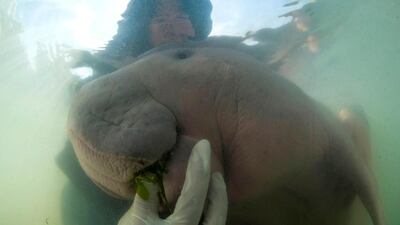The UAE is privileged to play host to the world’s second-largest population of dugongs, the gentle marine mammal known as the sea cow because of its habit of grazing on ocean seagrass.
Such privilege comes with responsibility, which the UAE takes seriously. Uniquely among the nations of the Gulf, in the UAE the dugong is protected by law, and has been ever since 1999.
In the UAE, home to the majority of the 7,300 dugongs estimated to live in the Gulf, conservation efforts have kept pace with development.
In May the environment agency released an enchanting video showing a large herd of dugong swimming in the waters of the 4,259 square kilometre Marawah marine reserve, the world’s first Unesco-designated marine biosphere reserve, off-limits to all but scientists, rangers and the wildlife they protect.
In 2017, in collaboration with the Convention on the Conservation of Migratory Species of Wild Animals, the Environment Agency Abu Dhabi hosted delegates from 23 of the 40 countries around the world that are home to the dugong, for a conference aimed at finding better ways to protect the animals from the pressures of the modern world.
Just how vital this work is was emphasised three days ago when Marium, an orphaned dugong calf that captured the hearts of millions around the world after she was rescued in Thailand, was found dead, killed by plastic she had swallowed.
Now, the discovery of six dugongs washed up dead on UAE beaches, drowned in discarded illegal fishing nets, is further grim proof that more needs to be done if this natural treasure is to be saved from extinction, not just locally but globally.
Today the dugong’s greatest threats are pollution, coastal development and the callous indifference of fishermen – it is an indictment of our times that only since the dugong ceased to be hunted in the Gulf in the 1950s have its numbers actually declined.
The UAE is leading the world in its efforts to protect this gentle, enchanting animal, but it cannot hope to save it alone. Marine researchers have warned that, unless neighbouring states co-operate with the UAE, unique among Gulf nations in legally protecting the dugong, its numbers are certain to fall further.

